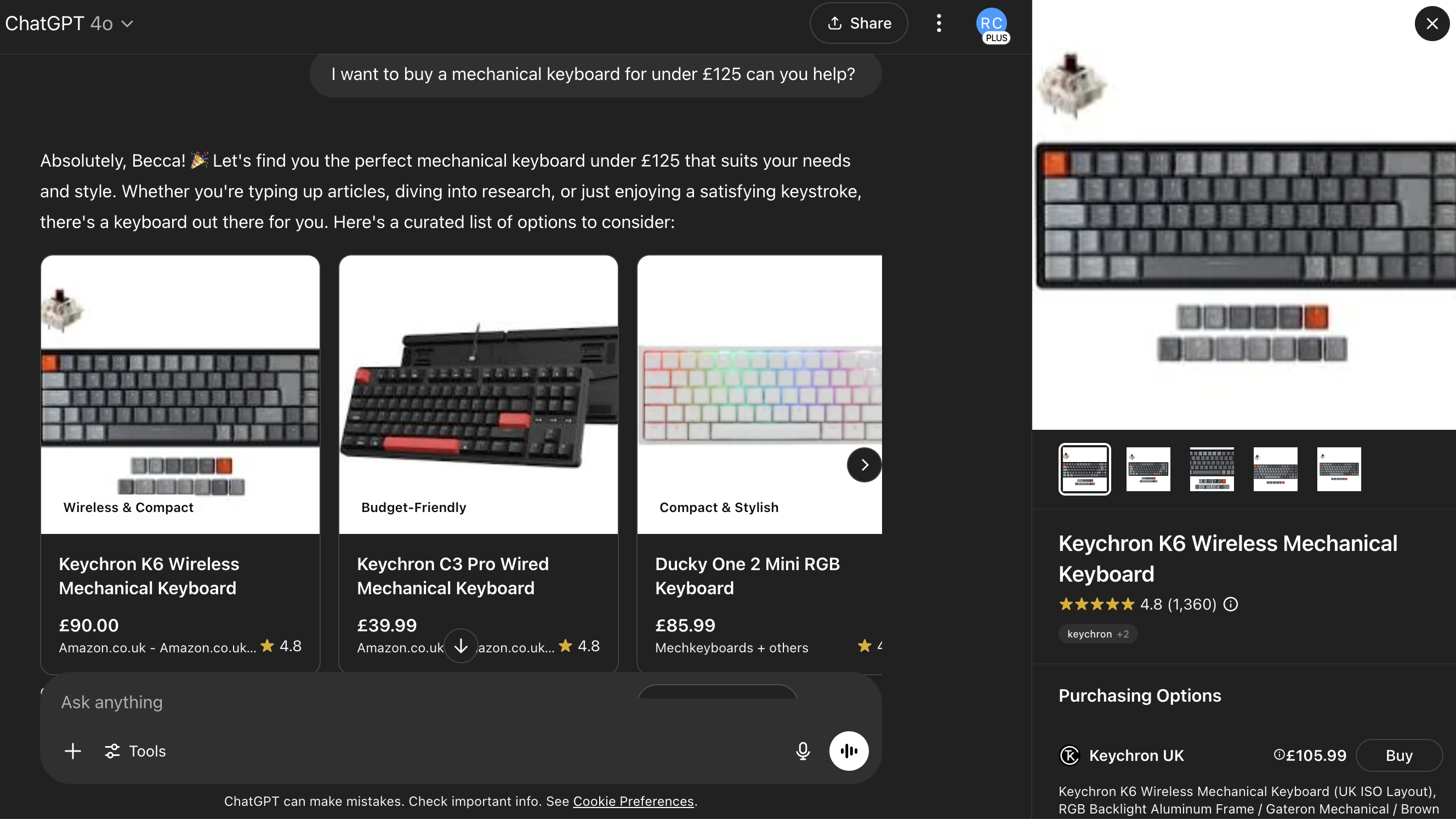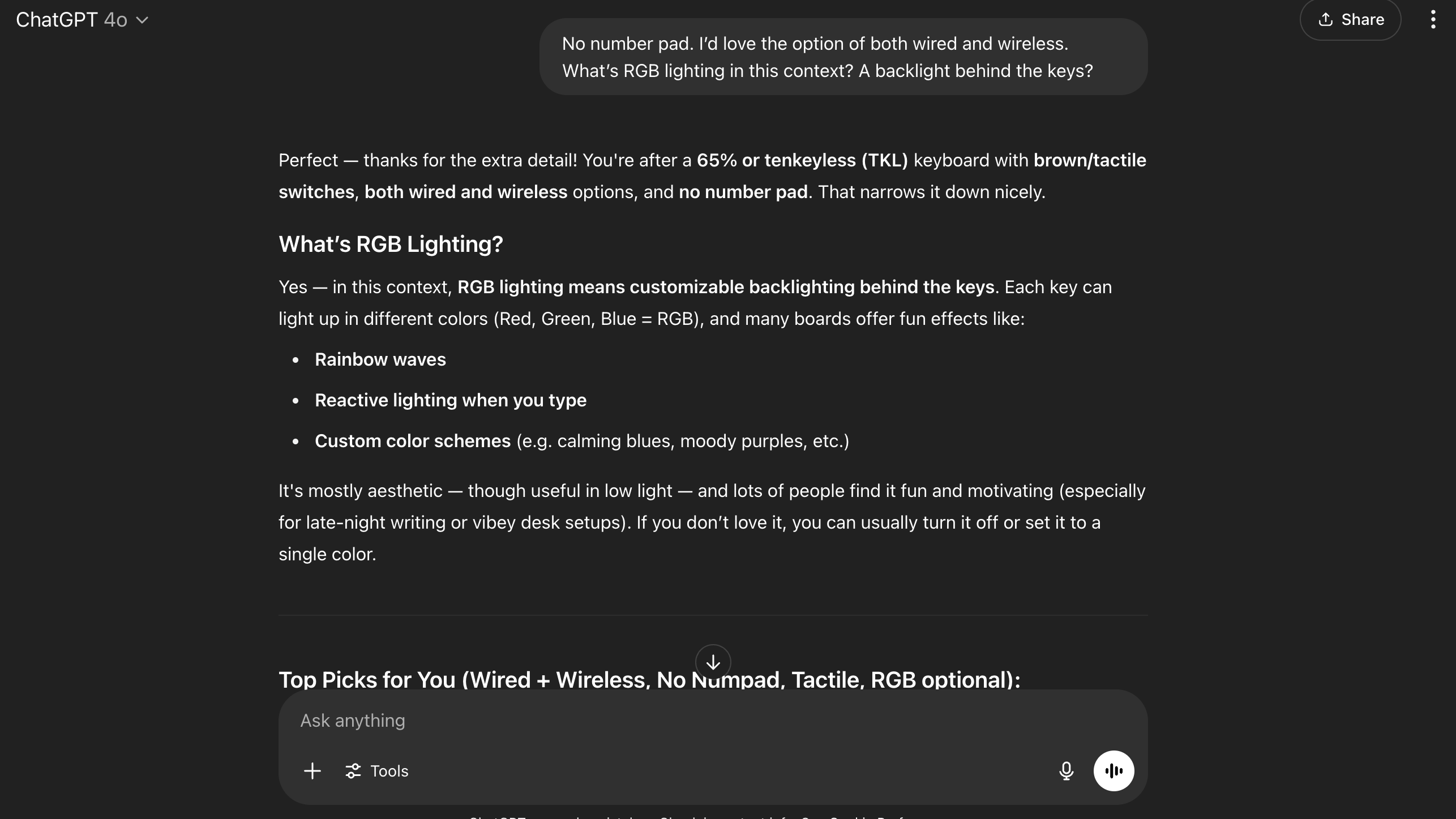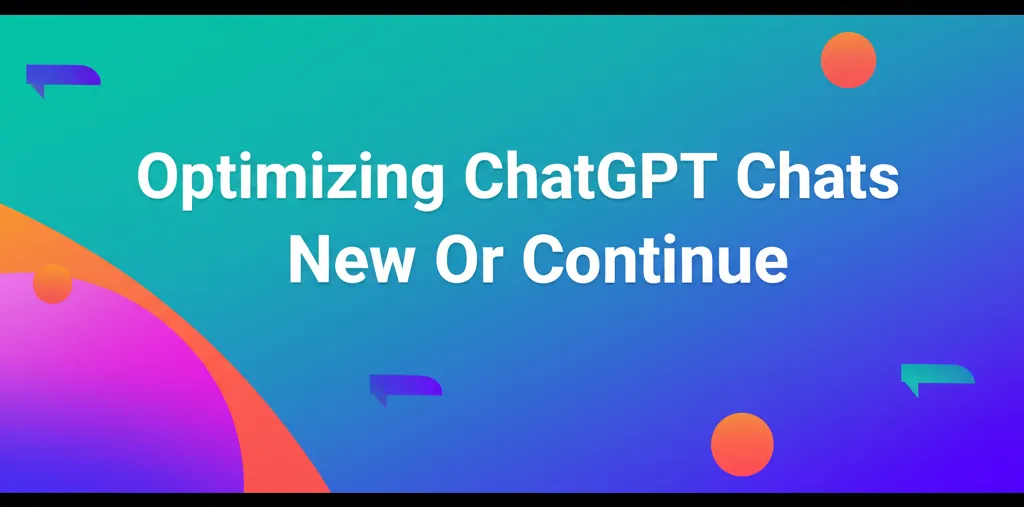Developer Offer
Try ImaginePro API with 50 Free Credits
Build and ship AI-powered visuals with Midjourney, Flux, and more — free credits refresh every month.
ChatGPTs New Shopping Tool A Hands On Review
 Tell ChatGPT you want to buy something and now it will help you choose (Image credit Future)
Tell ChatGPT you want to buy something and now it will help you choose (Image credit Future)
OpenAI has introduced a new shopping feature within ChatGPT. Imagine it as an integrated assistant capable of quickly scanning numerous reviews and recommendations, assisting you in finding and comparing products without leaving the chat interface.
This feature is accessible to all users, both free and premium, and is being progressively rolled out across various regions. So, what is the experience of shopping with ChatGPT like? Does it simplify the purchasing process? And could this signify the future direction of how we shop?
Experiencing ChatGPTs Shopping Capabilities
 Once ChatGPT has provided some shopping options, you can click on them for more details (Image credit Future)
Once ChatGPT has provided some shopping options, you can click on them for more details (Image credit Future)
To test the feature, I did not need to activate any special settings; I simply began typing in ChatGPT. Having been somewhat fascinated by mechanical keyboards recently, I typed: “I want to buy a mechanical keyboard for under £125 can you help?”
That prompt was sufficient to initiate the process. Any shopping related query, such as “Find me…,” “What is the best… to buy,” or “I am looking for…” automatically triggers the new shopping functionality.
ChatGPT responded by displaying a carousel of product suggestions. Each option featured an image of the keyboard, its product name, a star rating (primarily sourced from Amazon), a price, and a brief description highlighting key features like “compact & stylish,” “entry level,” or “budget friendly.”
Clicking on a product unveiled further details, including a selection of images, and linked directly to a few retail websites to finalize the purchase. (Currently, direct purchases within ChatGPT are not possible – and personally, I prefer this. I still want to review the final product page before checking out.)
Scrolling down further, there was a “Why you might like this” section, offering a concise summary of why that specific product was chosen for me. Additionally, a “What people are saying” section summarized key features with text snippets from various websites, including Reddit, Amazon reviews, and tech website reviews.
 (Image credit Future)
(Image credit Future)
Beneath the carousel, more details were provided. A section named “Top Picks Explained” offered brief justifications for each recommendation, along with links to third party sources for deeper investigation. Below that, a section titled “Considerations” detailed key factors such as layout size, connectivity, and switch type – the primary aspects to consider when purchasing a mechanical keyboard.
For individuals who find the endless process of comparing products across multiple sites overwhelming, shopping with ChatGPT feels like a shortcut. This is especially true when compared to Googling, navigating through numerous links, opening multiple tabs, reading Amazon reviews, tech review websites, and Reddit threads – only to abandon the search due to information overload.
ChatGPT functions as a filter, streamlining the shopping experience into a few well matched suggestions. And because it is a conversational interface, you can ask follow up questions to further refine your search.
In my case, my knowledge about mechanical keyboards was limited beyond wanting the classic clickety clack sound. So, I informed ChatGPT of this. It requested more details, such as my preferred size, layout, and switch type, and subsequently narrowed down the options. The interaction felt genuinely helpful and surprisingly personalized.
Another advantage is that these results do not seem to be driven by advertisements. They are sourced from a variety of third party retailers, editorial reviews, and community platforms like Reddit. This aspect will likely appeal to some users, as many online shopping tools are saturated with ads or sponsored content, making it difficult to discern paid placements. OpenAI has stated that listings in ChatGPT are not sponsored, and it currently does not earn revenue from purchases made through these recommendations.
For individuals skeptical about online recommendations, this could be a significant selling point. As long as it remains ad free, it may feel more organic and trustworthy than search engines or shopping sites that prioritize paid results.
Limitations and Considerations of AI Shopping
However, it is not performing anything revolutionary on the surface. It is not testing products or discovering hidden gems – other entities are undertaking that intensive work. What it is doing is collecting, synthesizing, and presenting information in a unified, conversational, and intuitive manner. This simplicity, in itself, is part of the innovation.
But how can we truly ascertain what influences these suggestions? Reports indicate that ChatGPTs shopping tool gathers data from diverse sources, including public product ratings, editorial reviews (like those on TechRadar), community forums (such as Reddit), and online retail catalogs. Users can even guide the assistant to prioritize certain types of reviews. While this offers a good degree of transparency, I still found myself questioning the breadth of its search and what information might be excluded.
There is also the wider issue of trust. As a tech journalist, I understand the importance of expert testing – particularly for equipment like keyboards, where tactile feel, performance, and real world context are crucial. There is a certain reassurance in reading a review from someone who has actually used the product, tested it, and explained its peculiarities. ChatGPT cannot replicate this.
For me, this tool functions best as an initial filter – a method to cut through the noise and reduce thousands of options to a manageable selection. But I still want to cross reference information, read full reviews, and hear from individuals whose opinions I trust. I would advise everyone reading this to do the same.
The Evolving Role of AI in Our Buying Decisions
Many people already utilize ChatGPT for research. It is logical that they would also use it for researching purchases, and the new shopping feature facilitates this even further.
With memory features becoming more sophisticated, ChatGPT may soon be able to remember your preferences and purchasing history. This means it might already know you would dislike loud switches on a new keyboard or that you have a small desk and would therefore prefer compact layout options – and then customize suggestions accordingly, without requiring you to repeat yourself. Such a level of personalization could entirely transform how we shop.
It is not solely OpenAI moving in this direction. Perplexity, an AI chatbot with a research orientation, now provides shopping recommendations to paid users through a partnership with Visa. Google is also intensifying its efforts in AI powered search tools, with shopping anticipated to be a central component of that evolution. The vision is apparent: AI is not just assisting you with shopping; it is also helping you decide.
For me, this is where matters become more intricate. I will concede, I appreciated the assistance. Sometimes, I simply want someone (or in this instance, something) to tell me what to buy. I am tired. We are all tired. And perhaps that is the appeal, not merely for shopping but for life more generally. ChatGPT does not just present options; it lessens decision fatigue and gives you one less thing to be concerned about.
But this delegation of decision making, even in minor ways, accumulates. The more we resort to AI to streamline the noise and simplify our lives, the more we must question where we establish boundaries. What occurs when convenience supersedes curiosity? Or when ChatGPTs personalized suggestions supplant genuine research or authentic recommendations from real people we know and trust? If AI is shaping what we purchase, and how we purchase it, we also need to remain cognizant of who is constructing these systems, what they prioritize, and what is being omitted.
Further Reading
Compare Plans & Pricing
Find the plan that matches your workload and unlock full access to ImaginePro.
| Plan | Price | Highlights |
|---|---|---|
| Standard | $8 / month |
|
| Premium | $20 / month |
|
Need custom terms? Talk to us to tailor credits, rate limits, or deployment options.
View All Pricing Details

